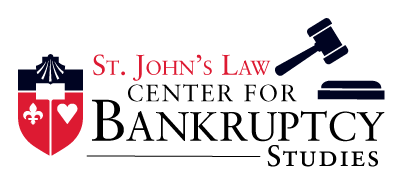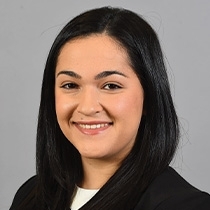Center for Bankruptcy Studies
What We Do
The Center for Bankruptcy Studies is home to all of the Law School's bankruptcy initiatives, including the nation's leading Bankruptcy LL.M. program, the American Bankruptcy Institute Law Review, the Bankruptcy Law Society, and the Bankruptcy Fellowship Program. The Center offers a wide range of programs for students, faculty, alumni, and practitioners throughout the year.
About the Center
A cornerstone of the Center for Bankruptcy Studies’ mission is to offer St. John’s Law students practical, engaging, and worthwhile opportunities in the bankruptcy field, including the:
- Bankruptcy LL.M.: The nation's only LL.M. in Bankruptcy program
- American Bankruptcy Institute Law Review: The leading scholarly journal on bankruptcy law
- Duberstein Bankruptcy Moot Court Competition: The only bankruptcy moot court competition and the largest single-site appellate moot court competition in the nation
- Bankruptcy Law Society: The Center's student organization affiliate, the Bankruptcy Law Society is open to all students interested in bankruptcy and presents special events on current issues in the bankruptcy field
- Advisory Board: Anchoring and overseeing our offerings is an Advisory Board comprised of leading professionals in the field
In connection with the Center and under its auspices, the Law School offers over two dozen specialized bankruptcy courses, the Bankruptcy Advocacy Clinic, and bankruptcy externships and internships. In addition, the ABI Bankruptcy Case Blog and the St. John’s Bankruptcy Research Library offer current research on cutting-edge bankruptcy cases and issues.
Support the Center
To support the Center and its initiatives, please visit the Law School's online giving page or contact Associate Dean for Law School Advancement Brian Woods at [email protected] or 718-990-5792.
Our Program
Advanced Bankruptcy Research
In this course, students work individually with a professor to produce a substantial, original work of advanced bankruptcy scholarship. The professor will work closely with each student to select the topic, perform the research, and commit the research to writing. Note: For LLM students who opt to continue with Bankruptcy Master’s Thesis, the grade for Advanced Bankruptcy Research may be deferred until completion of the Thesis course, at which time a final grade will be assigned based on the cumulative work of the student in each course. JD students must also satisfy the requirements of Directed Research in order to earn credit for this course and will not be permitted to take this course if they already have taken or plan to take Directed Research. Only two credits toward the JD degree may be awarded for the completion of this course.
Bankruptcy Clerkship Seminar
This seminar examines the role of bankruptcy law clerks with the goal of preparing students to be effective bankruptcy law clerks. Discussion topics will include advice to the new law clerk, an overview of the CM/ECF docketing system, calendar notes and “bench memos,” judicial ethics, opinion writing, reviewing motions, including a discussion of certain common motions, checking service, reviewing, and drafting proposed orders and judgments, the adversary proceeding process, and selected issues in chapter 11 and chapter 13. Students will be required to read and write weekly case summaries of decisions written by their respective judges and become familiar with the local rules and standing orders for their respective districts. The seminar grade is based on class participation and a written bench memo assignment. Schedule permitting, the class will visit the chambers of a bankruptcy judge to view oral argument and meet with the judge.
Bankruptcy Procedure
This course will include simulation and exercises in practice under the Federal Rules of Bankruptcy Procedure. The students will also draft pleadings, discovery requests, orders, and judgments in bankruptcy.
Bankruptcy Sales
This course examines the bankruptcy sale process. The course will cover the basic rules governing bankruptcy sales and will explore the motivations of the parties and creative uses of the sale process. Evaluation will be based on an examination, but class participation or a paper may be factored into the final grade. Pre-requisite for J.D. students: Creditors’ Rights or Business Bankruptcy Reorganizations.
Bankruptcy Taxation
This course will examine the tax aspects of bankruptcy practice. Taxation is a major aspect of many bankruptcy cases and an emerging sub-specialty in the bankruptcy field. The course will consider such areas as the post-confirmation carry forward of losses, and tax planning for entities in financial difficulty. Pre- or co-requisite for J.D. students Tax: Basic Federal Income.
Business Bankruptcy Reorganization
The course examines the reorganization of financially distressed enterprises under Chapter 11 of the Bankruptcy Code and the theoretical and economic underpinnings of reorganization. The course will consider all aspects of Chapter 11 from filing to confirmation of a plan of reorganization, conversion or dismissal. The following topics will be covered: good faith; venue; retention and compensation of professionals; the extent of the court’s equitable powers; use, sale and lease of the debtor’s property; successor liability; post-petition financing.
Complex Bankruptcy Litigation Seminar
This course will examine litigated aspects of fraudulent conveyances, equitable subordination, substantive consolidation, preference proceedings and contested proceedings for confirmation of chapter 11 reorganization plans, and civil RICO, lender, and CERCLA liability. The course will also address ethical issues such as conflicts of interest. Pre-requisite for J.D. students: Creditors’ Rights or Business Bankruptcy Reorganization.
Consumer Bankruptcy
This course will examine Chapter 7 and 13 of the Bankruptcy Code, including the principles of the fresh start and equality of distribution; the roles of the case trustee and United States Trustee; good faith and substantial abuse; the automatic stay; property of the estate; discharge, challenges to discharge and dischargeability; rights to convert and dismiss; bankruptcy petition preparers; and recent research concerning trends and developments in consumer bankruptcy filings.
Creditors’ Rights
This course deals with proceedings to enforce judgments, problems with respect to fraudulent conveyances, alternatives to bankruptcy, and a complete analysis of the Bankruptcy Code. Grades are based upon a final examination.
Directed Research - ABI Law Review
In this course, open exclusively to junior staff members of the American Bankruptcy Institute Law Review, students work individually to prepare a major research paper of advanced bankruptcy scholarship under the direction of a faculty adviser. The faculty advisor will work closely with the student to select the topic, perform the research, and commit the research to writing. To be awarded academic credit, the student shall have produced a final writing of at least 6,700 words in length (approximately twenty-five pages), inclusive of footnotes, that, except for the minimum grade, satisfies the guidelines in place at the time of registration and shall have prepared a detailed outline and have satisfied any other preparatory steps required by the faculty advisor. Pre-requisite: Legal Writing II. As with any course, Directed Research may be taken only once in a student’s academic program.
Drafting Bankruptcy and Commercial Agreements
This practice-oriented course will examine how to draft documents such as agreements pertaining to cash collateral, loans, asset purchases, disclosure statements, reorganization plans and post-petition loans. Pre-requisite for J.D. students: Pre-requisite for J.D. students: Creditors’ Rights or Business Bankruptcy Reorganization.
Executory Contracts in Business Bankruptcy
This course examines the treatment of executory contracts in bankruptcy. The course will cover the basic rules governing assumption, rejection and assumption and assignment, and the course will explore the motivations of the parties. Evaluation will be based on an examination, but class participation may be factored into the final grade. Pre-requisite for J.D. students: Creditors’ Rights or Business Bankruptcy Reorganization.
International Bankruptcy
This course focuses on cross-border insolvency issues that U.S. attorneys confront in practice. The course will study Chapter 15 of the U.S. Bankruptcy Code, including its derivation from the United Nations Commission on International Trade Law's Model Law on Cross-Border Insolvency, and emphasizing its provisions on obtaining U.S. recognition of foreign insolvency proceedings, providing relief to foreign representatives of foreign insolvency proceedings, and protecting the interests of U.S. creditors and those relying on U.S. law in dealing with foreign entities that later become insolvent. In particular, the course will examine the use of Chapter 15 to obtain the enforcement in the U.S. of debt restructuring plans approved by foreign courts. The course will also examine the use of Chapter 11 of the U.S. Bankruptcy Code by entities organized under foreign law to restructure their debts, and consider the extraterritorial aspects of U.S. bankruptcy law, and choice of law issues regarding international transactions and insolvency issues. Finally, the course will consider examples of how other countries' restructuring laws compare and contrast with Chapter 11, such as schemes of arrangement used in the United Kingdom and British Commonwealth countries, and also examine international insolvency regimes, such as the European Union Insolvency Regulation. Grades will be based on class participation and a final examination. Creditors’ Rights or Business Bankruptcy Reorganization is a recommended pre- or co-requisite.
Introduction to Bankruptcy Practice: Case Analysis (for ABI Law Review Members)
This course, open to junior staff members of the American Bankruptcy Institute Law Review, simulates the working environment of a law firm bankruptcy practice group. Students assume the role of entry-level associates who conduct time-sensitive research and writing assignments on cutting-edge bankruptcy issues. Students will thoroughly research the subject of their assigned issue and prepare a first, second and final draft of a comprehensive office memorandum. Each memorandum will be reviewed by the instructor and the instructor’s feedback will guide the student through the revision process. Evaluation will be based on the quality of the research and writing, as well as a brief presentation by the student to the instructor on the student’s research and findings. This course satisfies the JD Advanced Practice Writing Requirement.
Real Estate Workouts & Bankruptcy
This course will examine the consequences of real estate defaults, emphasizing the major current problems faced by real estate mortgagees, landlords, tenants and partners in default situations and mitigating drafting techniques that may be employed in the documentation stage. Among the areas covered will be: negotiating and drafting a workout agreement; lender liability; cram down of bankruptcy plans including classification and "new value" issues; and effect of bankruptcy of a real estate partner. Grades are based upon a research paper and a final examination. Pre-requisite for J.D. students: Creditors’ Rights or Real Estate Finance or Business Bankruptcy Reorganization.
Representing Trustees in Bankruptcy
This course examines current issues that arise in the representation of trustees in the bankruptcy process. Among other issues, the course will examine the powers and duties of a trustee, the role a trustee plays in different contexts, and the relationship between a trustee and the Office of the United States Trustee. The differing powers, duties, and roles of a trustee in Chapter 7, 11, 12 & 13 cases will be explored. Evaluation will be based on an examination, but class participation is required and may be factored into the final grade. Pre-requisite for J.D. students: Creditors’ Rights or Business Bankruptcy Reorganization.
Secured Transactions
In a secured transaction, a borrower gives the lender rights in the borrower's personal property in the event that the loan is not repaid. This course provides broad coverage of the primary pertinent statute, Article 9 of the Uniform Commercial Code, but also gives attention to key related provisions of the Bankruptcy Code. Grades are based upon a final examination.
Securitization, Structured Finance and Capital Markets
This course will examine the legal structure of securitization, a trillion-dollar industry. Securitization is the process by which a company sells its receivables (debts owed to it) to a special purpose entity (SPE) created specifically for that purpose. This form of financing can realize lower interest rates to the company selling the receivables than if the company borrowed against its receivables and kept title. The course will touch on various legal issues raised by this industry, including secured transactions, bankruptcy, corporate finance, securities regulation, corporate governance, and the role that legal opinions play throughout the deal process. The course will be graded based upon an in-class exam (80%) and class participation (20%). Pre-requisite for J.D. students: Creditors’ Rights or Business Organizations or secured Transactions or Business Bankruptcy Reorganization.
Select Topics in Bankruptcy (topics vary)
This course will be offered in the LL.M. Bankruptcy program periodically to explore a topic of major significance to the insolvency community that is not covered sufficiently in some other course. It will be a thorough, in-depth review of the issue and the problems arising therefrom. It will be taught by an expert or experts in the area involved. Students may enroll for multiple "Select Topics" course offerings but may not take the same offering for credit more than once. Evaluation will be based on an examination or paper at the discretion of the instructor (check with the LL.M. office). Class participation is required and may be factored into the final grade. Pre-requisite for J.D. students: Creditors’ Rights or Business Bankruptcy Reorganization.
Small Business Bankruptcy
This course will address and discuss the problems encountered by, and the possible solutions for small business entities (corporations, partnerships, and LLC's) in financial distress. In addition to facing all the same inherent problems that large businesses have in reorganizing and restructuring, small businesses face added burdens with regard to the inherent costs of successful reorganization and access to quality financial and legal advice. Likewise, small business creditors often look at huge write-offs that might be mitigated by a successful reorganization process. The goal is for the students to obtain a thorough understanding of the many issues involved in small business and agricultural bankruptcies. Evaluation will be based on an examination, but class participation may be factored into the final grade. Pre-requisite for J.D. students: Creditors’ Rights or Consumer Bankruptcy or Business Bankruptcy Reorganization.
Valuation & Remedies in Bankruptcy
This course will examine valuation and remedy issues that arise in bankruptcy cases. Topics considered may include valuations in dispute, valuation and finance theory, common methods of valuing a company and other unique assets such as IP, the proper role of the court in valuation disputes, and various remedies that valuation evidence can support, such as unjust enrichment and the avoidance remedies available under Sections 550 and 551 of the Bankruptcy Code. With a dual focus on theory and practice, the course will also include some study of the actual valuation reports submitted and the remedies that resulted in leading valuation cases. Grades will be based on a combination of participation and a research memorandum assignment of approximately 15 pages in length. Pre-requisite: Creditors' Rights.
St. John’s Bankruptcy LL.M. program is the nation's only LL.M. degree program devoted to bankruptcy law. This highly successful program offers a wide array of specialized bankruptcy courses taught by leading practitioners, judges, and academics.
As a student in the Joint J.D./LL.M. in Bankruptcy program, you can complete both your J.D. degree and your LL.M. degree in as few as seven semesters.
At St. John’s Law, bankruptcy courses are taught by a renowned faculty including bankruptcy scholars, judges, and seasoned practitioners with experience in a variety of areas of bankruptcy law.
Full-time Faculty
Adjunct Faculty
Hon. Jil Mazer-Marino ‘90
The Law School collaborates with the American Bankruptcy Institute (ABI) to publish the American Bankruptcy Institute Law Review. Widely regarded as the nation's premier scholarly bankruptcy journal, the ABI Law Review contains articles and student notes on cutting-edge issues of bankruptcy law and practice.
In addition to its biannual publication, the ABI Law Review helps to organize and run the prestigious Duberstein Bankruptcy Moot Court Competition, the only bankruptcy moot court competition in the nation. The ABI Law Review is responsible for the research and fact patterns that form the basis of the competitors' arguments. Its student members prepare the bench memo for all the competition judges, field two teams that litigate alongside the competitors, and serve as bailiffs in the preliminary rounds.
As part of the ABI Law Review, student members are highly encouraged to author notes on major bankruptcy issues affecting various legal disciplines, as well as interact with ABI leadership in the topic selection for each issue. Student editors and staff have complete control over the editing process.
The Center for Bankruptcy Studies' Bankruptcy Law Fellowship Program offers a select group of St. John's Law students an outstanding educational and pre-professional experience.
Students apply for the Program either in the summer as a rising 2L or 3L or during the winter of their 2L year and are admitted through a competitive process. The Program Review Committee selects candidates based on several criteria, including academic performance, a demonstrated dedication to bankruptcy as a career option, and potential benefits to be derived from the program.
The selected Bankruptcy Fellows participate in a unified program of academic and pre-professional instruction designed to prepare them for rewarding careers in bankruptcy law, including bankruptcy-focused externships, mentoring and clinical programs. They engage with the Center's strong alumni network, build connections in the bankruptcy industry, and participate in, and assist with, the Center's networking events, conferences, seminars, continuing legal education programs, and other initiatives.
Bankruptcy Fellows must complete at least 15 credits comprised of core foundation courses, elective courses from advanced J.D. and Bankruptcy LL.M. courses, and an experiential requirement. In addition to receiving preferential access to limited-enrollment elective courses, they benefit from the guidance of the Center's Director, a dedicated Career Development Counselor with expertise in bankruptcy career options. The Director works closely with Bankruptcy Fellows as they make decisions regarding curriculum, publications, internships, externships, and long-term career planning.
Ingrid Angulo ‘25
Ingrid Angulo is a St. John's Law 2L and serves as a Staff Member of the St. John’s Law Review, Event Coordinator of the Bankruptcy Law Society, and Director of Marketing and Communications of the Gaming Law Society. She is also a member of the Dispute Resolution Society. She graduated from Northeastern University in 2020 with a B.A. in International Affairs with minors in Journalism and Economics. This past summer, Ingrid interned with Hon. Elizabeth S. Stong, U.S. Bankruptcy Court, Eastern District of New York, where she developed a strong passion for bankruptcy law. As a Bankruptcy Fellow, she looks forward to engaging with the community of bankruptcy professionals and to further exploring her interests in the field.
Myah Drouin ‘24
Myah serves as an Executive Articles Editor for the American Bankruptcy Institute Law Review, as well as the Vice President of the Bankruptcy Law Society. During her 2L year, she was a judicial intern to Hon. Hector Gonzalez , U.S. District Court, Eastern District of New York. She is excited to be back in chambers as a 3L with Hon. Jil Mazer-Marino '90, U.S. Bankruptcy Court, Eastern District of New York. As a St. John's J.D. student, Myah has enjoyed taking classes offered through the Law School's Bankruptcy LL.M. program. As a Bankruptcy Fellow, she looks forward to planning exciting programing events and furthering networking opportunities for both alumni and students.
Annmarie Gruick ‘24
Annmarie is a 3L at St. John's Law and serves as Executive Articles Editor of the American Bankruptcy Institute Law Review and as President of the Bankruptcy Law Society. During her 2L year, Annmarie interned with Hon. Alan S.Trust, Chief Judge, U.S. Bankruptcy Court, Eastern District of New York. She won an Hon. Dorothy T. Eisenberg Women in the Law “Trailblazer” Award in 2023 for her interest in bankruptcy and commitment to continuing to pave the way for future generations of women professionals. This past summer, as the Hon. Thomas L. Ambro Fellowship Summer Scholarship recipient, Annmarie interned in the U.S. Bankruptcy Court, District of Delaware. As a Bankruptcy Fellow, she looks forward to further developing as a bankruptcy and restructuring professional and to helping others do the same.
Katharine Manganello ‘24
Katharine Manganello is a 2L student and serves as a Staff Member of the American Bankruptcy Institute Law Review. She is also a Staff Member of the Moot Court Honor Society. She graduated from Colgate University in 2019 with a B.A. in Economics and a minor in Psychology. During college, Katharine participated in the Consumer Bankruptcy Project, which sparked her interest in bankruptcy. Following her 1L year at St. John's, she interned with the Hon. Sean H. Lane, U.S. Bankruptcy Court, Southern District of New York. As a Bankruptcy Fellow, she looks forward to working with others interested in bankruptcy and to planning events for alumni and students.
St. John's Law students can gain hands-on experience in, and practical knowledge of, bankruptcy law by participating in the Bankruptcy Law Society (BLS). Throughout the academic year, BLS holds regular meetings and hosts special events where distinguished judges and practicing attorneys address current issues in the field of bankruptcy. It also offers students membership in the American Bankruptcy Institute and the Turn Around Management Association.
Jointly sponsored by St. John’s Law and the American Bankruptcy Institute, the annual Duberstein Bankruptcy Moot Court Competition is the nation's only bankruptcy moot court competition and its largest single-site appellate moot court competition. The event is named for distinguished St. John’s alumnus and former ABI Director, Hon. Conrad B. Duberstein '41, '91HON, who passed away in 2005 at the age of 90.
The Bankruptcy Advocacy Clinic is a full-year clinic offered in partnership with Legal Services NYC, the largest U.S. organization devoted exclusively to providing free civil legal services to low-income people.
The Center for Bankruptcy Studies collaborates closely with the Law School's Externship Program to place students in externships where they work directly with an assigned mentor attorney on bankruptcy-related matters. Externship placements span the legal spectrum and include work in public interest organizations, governmental agencies, private law firms, judicial chambers, and corporate legal offices.
Summer Public Interest Fellowship
In collaboration with the Law School's Public Interest Center, the Center for Bankruptcy Studies awards a Summer Public Interest Fellowship to a rising 2L or 3L to support their summer work with with nonprofit and governmental organizations that assist traditionally underrepresented clients, groups, or interests relevant to bankruptcy law.
Past Recipients
2023: Erenada Pantazi ’25, Hon. Jil Mazer-Marino ‘90, U.S. Bankruptcy Court, Eastern District of New York
Bankruptcy LL.M. Program Scholarships
There is a limited, partial scholarship fund available to St. John's Bankruptcy LL.M. students, who are awarded scholarships based on their credentials, potential for success, and need. To apply for a scholarship, students should submit a letter to the Bankruptcy LL.M. Program Director detailing how they meet the selection criteria.
2023
What Every Attorney Needs to Know About Bankruptcy Law But is Afraid to Ask
Panelists
- Hon. Alan S. Trust, Chief Judge, U.S. Bankruptcy Court, E.D.N.Y.
- Elizabeth M. Aboulafia '08, Partner, Cullen & Dykman LLP
- Sheryl P. Giugliano '08L, '09LL.M., Partner, Ruskin Moscou Faltischeck, P.C.
Moderator
Laura B. Schwartz '90, Director, St. John’s Law Center for Bankruptcy Studies and Career Development
Co-Sponsors
Federal Bar Association, Eastern District of New York Chapter
St. John's Bankruptcy Law Society
Bankruptcy Law Alumni Reception: Celebrating the 30th Anniversary of the ABI Law Review
Honoree
Thomas Michael Horan '04, U.S. Bankruptcy Judge, District of Delaware
To come





